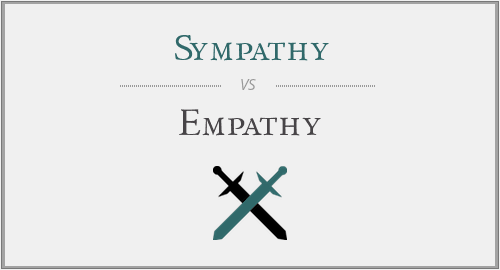The terms sympathy and empathy is an addition to the list of the commonly confused pair of words. It may be attributed to the fact that both the words have to do with the person’s relationship with feelings and emotions. This article will explain the meanings of both the words in order to enable you to properly use them in your writing.
Sympathy as noun:
The word sympathy originated in the late 16th century from the Greek word sumpatheia meaning feelings. The word is utilized as a noun in describing the feelings of sorrow and pity one feels for another person’s misfortune and adversity. We all have great sympathy for the earthquake victims. The formal expression of pity or sorrow for someone else's misfortune. Trevor’s friends joined in to send sympathy to his widow. The understanding between two people or a common feeling regarding something in a group is also described as sympathy. The special sympathy between the two girls was obvious to all. Someone’s support in the form of shared opinions and feelings is termed as sympathy.
My sympathies lay with my constituents.
A favorable attitude, or an agreement or approval of an opinion is called sympathy. We all have sympathy for this view. Sympathy is also described as relating harmoniously to something else. The repairs were in sympathy with the original structure. The state or fact of responding in a way similar or corresponding to an action elsewhere is also called sympathy.
The magnetic field oscillates in sympathy.
Empathy as noun:
The origin of the word empathy is from a Greek word empatheia, em ‘in’ and pathos ‘suffering’ in the early 20th century. The word is used as a noun to describe a person’s ability to understand and share the feelings of another. The understanding of one’s feelings in a terrible situation as if it is happening to yourself is a characteristic attribute known as empathy.
Sara empathize with the flood victims.
Examples:

“A Sad Liberal’s Extremely Short Thanksgiving Plea for Empathy.” (Huffington Post)
“Why the country is having a big debate about empathy after Donald Trump’s election.” (Vox)
“Empathy by the Book: How Fiction Affects Behavior.” (Wall Street Journal)
“The government must not mistake the empathy we feel for Denise Fergus’s loss with sympathy for her views.” (Guardian)
“Chinese President Hu Jintao and Premier Wen Jiabao conveyed sympathy to the nine coal miners who were safely taken out of the Wangjialing Coal Mine.” (English.news.cn)
“Refugee survivor has no sympathy for Springvale Commonwealth Bank asylum seeker blast suspect.” (Herald Sun)
Sympathy vs. empathy
Both words sympathy and empathy are both very closely related to each other with the dangling modifier between them. When a person sympathize with another person, they have compassion for them but they don’t necessarily feel what they are feeling. Empathy however, needs one person to sympathize as well as feel like they are in the position of the other person, experiencing the exact emotions they are feeling.
Empathy requires the sympathy along with other strong emotions on your end.




Have a discussion about this article with the community:
Report Comment
We're doing our best to make sure our content is useful, accurate and safe.
If by any chance you spot an inappropriate comment while navigating through our website please use this form to let us know, and we'll take care of it shortly.
Attachment
You need to be logged in to favorite.
Log In